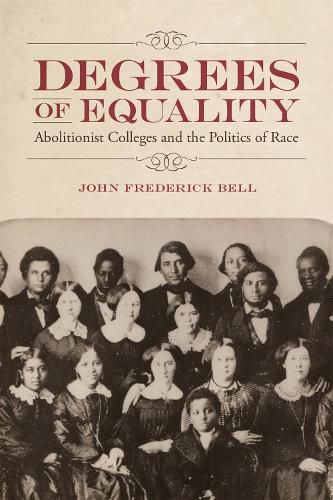Readings Newsletter
Become a Readings Member to make your shopping experience even easier.
Sign in or sign up for free!
You’re not far away from qualifying for FREE standard shipping within Australia
You’ve qualified for FREE standard shipping within Australia
The cart is loading…






The abolitionist movement not only helped bring an end to slavery in the United States but also inspired the large-scale admission of African Americans to the country’s colleges and universities. Oberlin College changed the face of American higher education in 1835 when it began enrolling students irrespective of race and sex. Camaraderie among races flourished at the Ohio institution and at two other leading abolitionist colleges, Berea in Kentucky and New York Central, where Black and white students allied in the fight for emancipation and civil rights. After Reconstruction, however, color lines emerged on even the most progressive campuses. For new generations of white students and faculty, ideas of fairness toward African Americans rarely extended beyond tolerating their presence in the classroom, and overt acts of racial discrimination against Blacks grew increasingly common by the 1880s.
John Frederick Bell’s Degrees of Equality analyzes the trajectory of interracial reform at Oberlin, New York Central, and Berea, noting its implications for the progress of racial equality in nineteenth-century America. Drawing on student and alumni writings, institutional records, and promotional materials, Bell uses case studies to interrogate how abolitionists and their successors put their principles into practice. The ultimate failure of these social experiments illustrates a tragic irony of interracial reform, as the achievement of African American freedom and citizenship led whites to divest from the project of racial pluralism.
$9.00 standard shipping within Australia
FREE standard shipping within Australia for orders over $100.00
Express & International shipping calculated at checkout
The abolitionist movement not only helped bring an end to slavery in the United States but also inspired the large-scale admission of African Americans to the country’s colleges and universities. Oberlin College changed the face of American higher education in 1835 when it began enrolling students irrespective of race and sex. Camaraderie among races flourished at the Ohio institution and at two other leading abolitionist colleges, Berea in Kentucky and New York Central, where Black and white students allied in the fight for emancipation and civil rights. After Reconstruction, however, color lines emerged on even the most progressive campuses. For new generations of white students and faculty, ideas of fairness toward African Americans rarely extended beyond tolerating their presence in the classroom, and overt acts of racial discrimination against Blacks grew increasingly common by the 1880s.
John Frederick Bell’s Degrees of Equality analyzes the trajectory of interracial reform at Oberlin, New York Central, and Berea, noting its implications for the progress of racial equality in nineteenth-century America. Drawing on student and alumni writings, institutional records, and promotional materials, Bell uses case studies to interrogate how abolitionists and their successors put their principles into practice. The ultimate failure of these social experiments illustrates a tragic irony of interracial reform, as the achievement of African American freedom and citizenship led whites to divest from the project of racial pluralism.